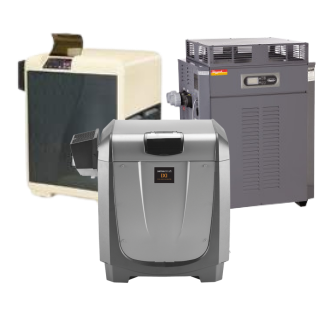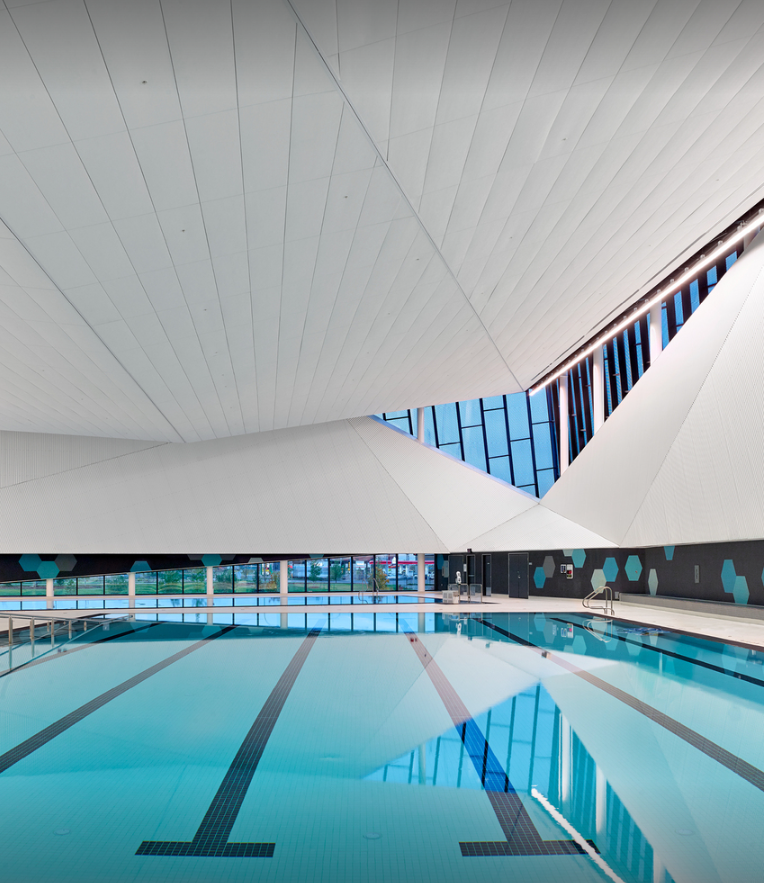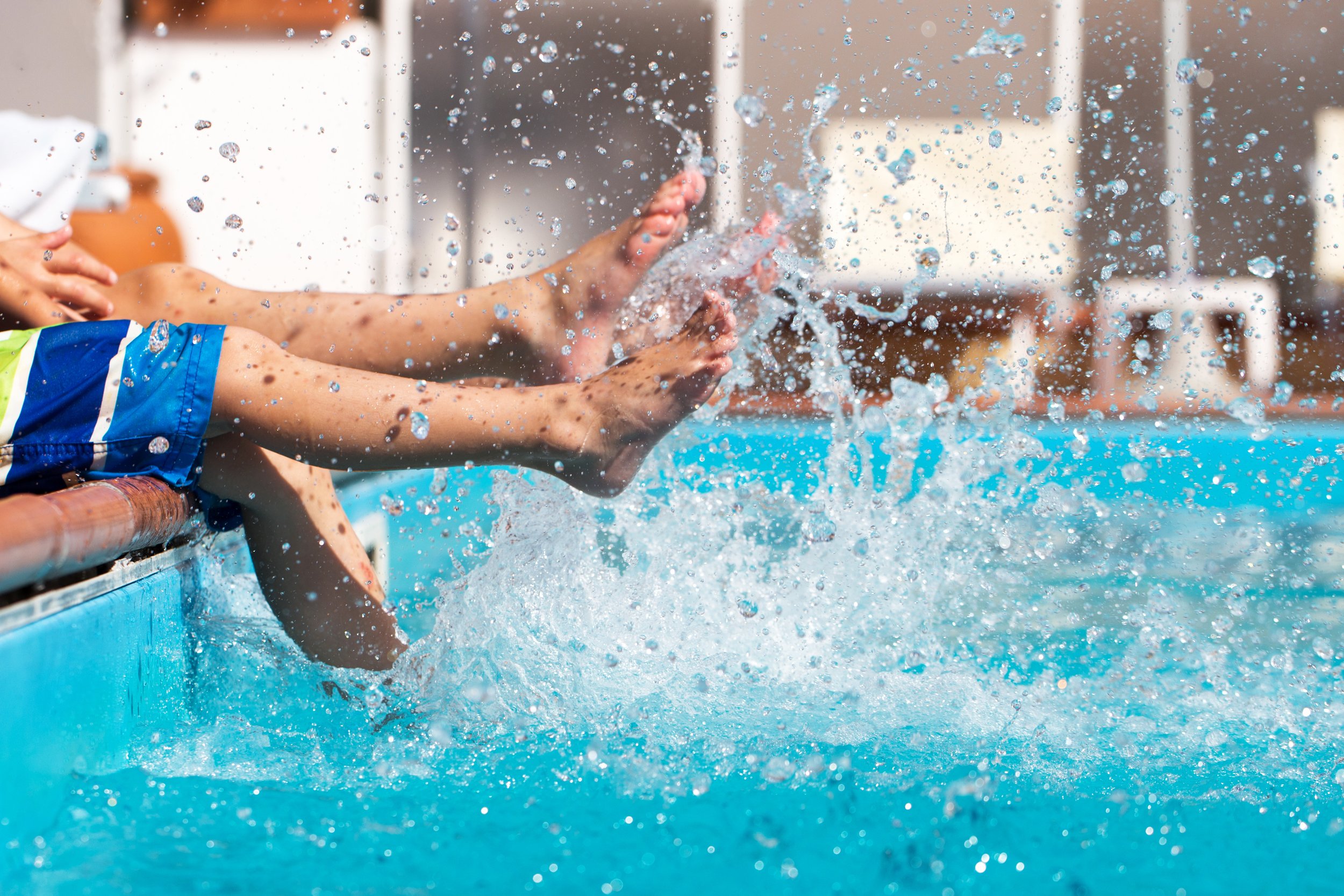
Pool heating.
Help is here. Whenever and however you need.
Residential. Commercial.
Competent. Capable. Reliable.

Gas heaters

Residential heat pumps

Commercial heat pumps

Indirect heating solutions

General equipment
Whether you’re looking for something new or just need our help to get your pool (or spa) hot again, as longstanding service technician members of the Master Pool Builders Association of Australia and Authorised Service Agents for some of the industry's biggest heater manufacturers (Raypak, Astral & Pentair), rest assured, if it’s pool heating related then we’re the right people for the job!
We offer a wide range of services across both residential and commercial applications and are skilled and competent in all pool heater makes and models, old and new.
So whatever your need, contact us today and let us help.

Residential pool heating

Commercial pool heating
Services.
-

Maintain
Preserve your heater’s efficiency, effectiveness and longevity with regular servicing.
-

Repair
When you have a problem and need assistance or feel something just isn’t right and require expert advice.
-

Replace
Either proactively or when its time has come to an end, we can replace any item of equipment within your system.
-

Upgrade
System in need of a refresh? With so many options to consider, let us assist by determining what’s best for you.
-

Additions & extensions
Adding to or extending your system, we can help.
-

Relocations
When you need something moved either permanently or temporarily?
-

Decommissions
We can disconnect and decommission any aspect of your system or the system itself if need be!
-

Other
Have a question or looking for something specific? Whatever the need, if it’s pool or spa heating, we can help.
RESIDENTIAL POOL HEATER SERVICING
Don’t risk a cold pool!
Service your heater before the season starts.
Pool & spa heaters are expensive to replace, so look after yours by having it serviced every year.
With highly chemicalised water running through them, coupled with high running temperatures, it's essential they are regularly inspected, cleaned and tested to ensure their safety and running efficiency.
So book yours in for its $275* service today and swim in comfort this season.
*terms and conditions apply
Pool & spa heating. Common requests.
Whilst our more common requests are shown below, we offer a lot more, so whatever your need, contact us today and let us help.
-
We supply and install the majority of commonly available heaters on the market, so let us assist by determining what’s best for you and at the most competitive price.
-
We can assist by firstly safely disconnecting and removing your heater, capping off its Natural Gas supply and then completing works required to re-plumb, re-connect and re-establish your system.
-
If you’re looking for a trusted, professional and reliable business to assist you and your clients with their heater needs, then you’ve come to the right place!
We already work with a lot of Melbourne pool building and maintenance companies, representing some in addressing their clients’ heater needs under their guise, along with also being referred the works by others, so that we engage and work with the client directly.
So whatever your preference, contact us to discuss how we can help.
-
We can fix almost any problem your heater may have!
As a service orientated company, we always aim to repair over replace (of course where it makes sense) and as such carry the majority of brands commonly used spare parts on hand, so we can hopefully fix your issue within the initial visit.
If we cannot fix your heater on the day, whatever the reason may be and/or we deem it beyond economical repair, we will quote you on what is required (i.e. repair or replace) and if you are comfortable with what we have proposed, we will return asap to complete the job.
-
With highly chemicalised water constantly running through your heater, coupled with a very high running temperature, it’s essential that it is regularly serviced in attempt to preserve its effectiveness, efficiency, longevity and most importantly safety.
Servicing incorporates inspection, detection and correction activities and how regularly it should be done does depend on your usage of it. Typically, we recommend annual servicing for heaters installed in residential applications and six monthly servicing for heaters supporting commercial systems.
So contact us and let us help you help your heater with a quality service.
-
There will come a time where your heater’s best days are behind it and you’ll need to upgrade it.
As we supply and install the majority of commonly available heaters on the market, we can help.
So with so many options to consider, let us assist by determining what’s best for you and at the most competitive price.
-
From public pools to private swim schools, we partner with many different businesses proactively and professionally maintaining their pool heating systems.
So if you’re looking for a trusted, professional and reliable business to partner with to maintain your assets, contact us today to discuss how we can help!

Considered high efficiency indirect pool heating?
Learn more below.
A direct heating system incorporates a heater that directly heats the pool water, whereas an indirect heating solution decouples the two, in that the pool water never comes into direct contact with the heater.
Rather, the heater provides heated water to an external heat exchanger which also has the pool water passing through it (though in a separate chamber) and it is here where the heat transfer occurs. This creates in essence two independent heating loops as each loop’s contents (water) can never come into direct contact with the other.
The benefit of such a solution is that with the pool water never actually coming into contact with the heater itself, the risks associated with poor water chemistry, e.g. water that is too highly concentrated, damaging the heater’s internals and hence its longevity are mitigated.
And with the external heat exchanger being made of Titanium (a material far less susceptible to damage from poor water chemistry than what most pool heater’s internal heat exchangers are made of) this makes for a much more robust solution.
In regards to the high efficiency aspect, typically pool heaters convert ~80% of the gas they consume (energy in) into usable heat (energy out), i.e. ~20% of energy in is wasted in the conversion process, which defines them as standard efficiency. Whereas in this solution, the heat source is a condensing boiler that runs at about 95% conversion efficiency and when coupled with its much greater turndown ratios (again compared to standard pool heaters) makes it a much more efficient solution. This increased efficiency translates into lower gas consumptions and hence running costs, which of course results in dollars saved.
If you’re interested in understanding this solution further, then please call us to discuss.

Don’t let a cold pool stop the fun!
Contact us to repair or replace your heater and bring back the heat.
-
Step 1. Make sure there’s power to it.
Typically these days heaters are either plugged into a standard electrical GPO (power point) or into a point on a controller and it’s not uncommon for a plug to come out of a socket or a circuit breaker to trip, so before you do anything make sure there is power running to yours and if you don’t then maybe check these things first.
Step 2. Make sure there is enough flow.
Pool heaters have minimum flow requirements that they detect via internal sensors (and in some cases external ones) and if they do not detect enough flow (or pressure as is the case in some situations), they will shut down. So it’s also worthwhile to check over your system as a whole to ensure that you don’t have anything restricting your flow, for example debris in your skimmer box or your automatic pool cleaner is running.
Step 3. Call us!
If you get to this point, then it’s most likely you have an issue that only a professional can fix, though before you call us, please record any fault codes that may be displayed on your heater as these help us understand what it is we need to fix.
-
From Pentair and Raypak, to Insnrg and Astral, we work on all heater makes and models, old and new, with the majority of brands (and their models) familiar to us listed below;
• Astral (HiNRG, HW, HX, ICI, IXI, HX, JX, MX, Viron and Viron eVo)
• Raypak (Residential and Premium)
• Pentair (MasterTemp, Max-E-Therm and TurboTemp)
• Insnrg (GI)
• Zodiac (JXi, LXi, LRZ, WLRZ)
• Hayward (H series)
• Laars / Jandy (Lite2, LC, LD, LJ, LXI, LRZ)
-
Yes, with highly chemicalised water constantly running through your heater, coupled with a very high running temperature, it’s essential that it is regularly serviced in attempt to preserve its effectiveness, efficiency, longevity and most importantly safety.
Servicing incorporates inspection, detection and correction activities and how regularly it should be done does depend on your usage of it. Typically, we recommend annual servicing for heaters installed in residential applications and six monthly servicing for heaters supporting commercial systems.
So contact us and let us help you help your heater with a quality service.
-
• A gas heater will heat your pool up faster than what an equivalently sized heat pump can.
• A gas heater will be able to heat your pool all year round, whereas a heat pump will struggle to do the job in the colder months (due to its design principles with in most cases if you do want to heat your pool up during these times, you’ll need to install a gas booster to support the heat pump).
• Heat pumps require other aspects to be incorporated into your system for them to be truly effective, e.g. pool blanket, solar feed, whereas with a gas solution, all you need is the heater.
• Heat pump installs are more expensive than gas heaters (especially if you want to swim on the colder months as if so you’ll need to include a small gas heater to act as a booster!).
• Heat pumps are more efficient, in terms of energy used (in) to produce energy out.
-
As there is a science behind it, determining what’s best for your situation can be complicated, so let us take care of it for you!
We like to keep things simple, so contact us with the below information and we can quickly let you know what heater/s make and models will suit.
1. Pool dimensions (Length x Width x Average Depth).
2. Your desired swimming (water) temperature.
3. How quickly you would like this temperature to be reached from when you turn your system on.
4. Whether your pool/spa is located inside or outdoors and whether it has a cover.
-
Typically in Australia, pools are set between 26°C and 28°C, with spas set between 36°C and 38°C.
Whilst of course the choice is yours, it’s important to note that the majority of heaters have a maximum heat output of 40°C.
Pool & spa heating. FAQs.








